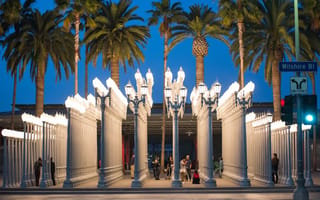
We’re just a few days away from 2020 officially being over. Congrats, you made it. We made it. Now let’s never do that again.
2020 was a strange year for so many of us, and because so much happened — between the pandemic, national protests, a heated election and so on — it can be easy to forget what happened just a few months ago.
From hiring sprees to product launches, it was also a busy year in LA tech. To reminisce — and also celebrate our survival — Built In LA is taking a look back on the news stories that you, our readers, cared the most about this year. So let’s take a trip down memory lane.

#5. CaliBurger partnered with tech companies to launch COVID-19 screening tools. When the COVID-19 pandemic first hit, restaurants across the country had to quickly change the way they operate or risk going out of business. For many, that meant adopting new takeout and delivery protocols, enabling online ordering or, for CaliBurger, installing state-of-the-art AI fever scanners at restaurant locations. In March, the SoCal burger chain announced its partnership with PopID and Miso Robotics. This partnership allowed CaliBurger to install technology that screened staff and customers for COVID-19 symptoms. It also helped the company introduce several contact-less payment solutions, in order to minimize the risk of COVID-19 infection.
#4. QuickHire launched the Tinder for blue-collar job seekers. Sisters Angela Muhwezi-Hall and Deborah Muhwezi-Gladney grew up supported by parents who worked various blue-collar jobs. While they’re hardly the only children who grew up this way, as adults they noticed that few job listing sites catered for this type of work. That’s why they launched QuickHire and its corresponding app. With the app, job applicants can set up a profile with information about them, and then quickly view and apply to numerous jobs. The founders built the app to resemble a dating app. The app’s algorithm shows applicants one job at a time based on their qualifications and interests, and then allows them to swipe right to apply or swipe left to move on.

#3. Tapcart raised a $10 million Series A funding round and announces hiring push. While Built In covers countless stories about companies raising funding, Tapcart’s funding round ranked as one of our most-read stories in LA this year. The company has created a mobile app building platform that has seen a surge in demand in 2020. This could be due to the overall trend of tech adoption, as the pandemic forced businesses to reassess their digital presence. As business was booming, Tapcart also announced that it would be doubling its headcount over the span of two years, bringing the 35-person company to 70 employees.
#2. TikTok opened its new office in Culver City. As TikTok’s popularity grew across the world, its corporate presence grew as well. In January, the Chinese company revealed its plans to move into a larger LA headquarters, with room to fit up to 1,000 employees. Although TikTok went through some drama this year when the U.S. government tried to ban the app or force its sale to a U.S. company, that has yet to pan out. In the meantime, TikTok has been steadily growing. It currently has more than 100 open job listings for its LA-based team.

#1. Headspace is giving away its premium membership for free to healthcare workers. The most-read news story on Built In LA in 2020 was about Santa Monica-based Headspace offering free mental-health services to healthcare workers, which is pretty much 2020 in a nutshell. The announcement was made in March, just as the country was beginning to grapple with what the coronavirus pandemic would mean for us. Since then, Headspace has expanded to offer its services for free to unemployed Americans, and other mindfulness/meditation apps have seen a surge in demand. Although we’re still in the middle of a health and mental-health crisis, this year has shown us that we are lucky enough to have tech tools — from telehealth to grocery delivery and more — that make living in a pandemic a little bit easier.






